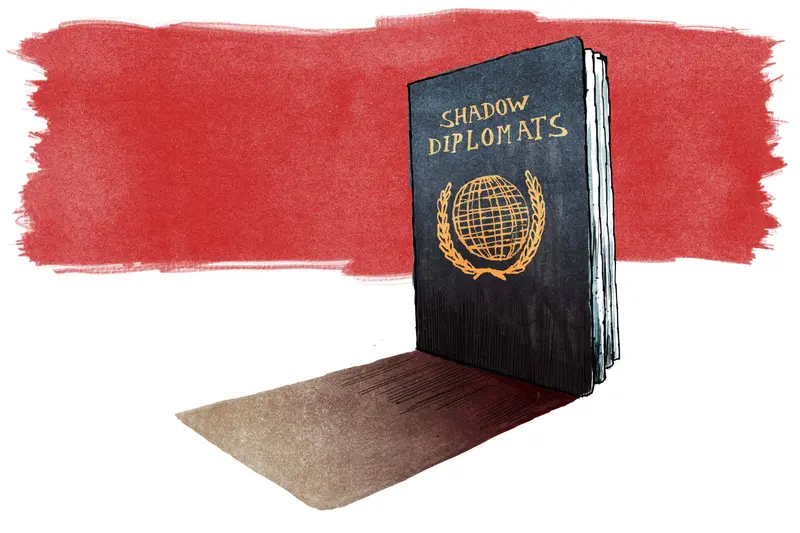“Shadow Diplomats” marks the first collaboration between ProPublica and the International Consortium of Investigative Journalists. One hundred and sixty journalists from 46 countries joined the reporting.
The investigation shines light on one of the least-examined roles in international diplomacy: the honorary consul. These volunteer diplomats work from their home countries to promote the interests of foreign governments, typically in places without an embassy or consulate.
Many honorary consuls provide valuable services. But the system, intended to leverage the experience and connections of upstanding citizens, has empowered unscrupulous operators and imperiled vulnerable communities around the world.
ProPublica, ICIJ and media partners identified at least 500 current and former honorary consuls who were accused of crimes or embroiled in controversy. Some were convicted of serious offenses or caught exploiting their status for personal gain; others drew criticism for their support of authoritarian regimes.
Consuls have stood accused of hiding cash and contraband in their offices and pouches. They’ve invoked diplomatic credentials to avoid searches and arrests. They’ve denounced sanctions against Russia and publicly supported the invasion of Ukraine.
The numbers are almost certainly an undercount. Seventy-eight countries do not make public the names of their honorary consuls. The lack of transparency and accountability fuel the controversies at the heart of this investigation.
Before the investigation was published, questions from reporters working on the project prompted impact in two countries. Germany and Austria announced the dismissal of one consul in Brazil. Another consul in Switzerland announced his resignation.
How the Reporting Started
Scattered references to honorary consuls have surfaced for years in leaked documents at the center of multiple investigations by ICIJ and its partners into the world of offshore wealth.
ProPublica reporter Debbie Cenziper and ICIJ reporter Will Fitzgibbon began pulling together narratives and case studies chronicling the abuses perpetrated by honorary consuls. Media partners around the world, as well as student journalists from Northwestern University’s Medill Investigative Lab, led by Cenziper, were instrumental to this effort.
The names of consuls — or sometimes simply their titles — came up in news clips, government investigations, sanctions lists and other reports. Reporters searched court databases in Brazil, France, Ukraine, Spain and Germany, and they submitted public information requests in Croatia, Finland, El Salvador and Honduras, among other countries.
Patterns started to emerge. The team identified consuls who have been linked by law enforcement and governments to the terrorist group Hezbollah — reporting featured prominently in ProPublica and ICIJ’s lead story.
The team also identified consuls sanctioned by the United States and other governments, including members of Russian President Vladimir Putin’s inner circle. Those findings will feature in a forthcoming story that examines Russia’s use of the honorary consul system.
Transparency Challenges
There is no international database of honorary consuls, and many countries maintain poor records or release no information at all. ICIJ’s data team contacted the foreign ministries of countries that failed to make the names of their consuls public. Reporters requested the names of their consuls and other information about them; most ministries failed to reply.
Using information from public records requests and lists of consuls published online, the team created an index to assess the transparency of countries and their honorary consul appointments.
The findings will be part of a forthcoming story about how governments have failed to oversee the troubled system of international diplomacy.
ProPublica contributors: Debbie Cenziper, Ziva Branstetter, Matt Orr, Lisa Larson-Walker, Boyzell Hosey, Diego Sorbara, Lena Groeger, Alexis Stephens, Tracy Weber and Steve Engelberg.
ICIJ contributors: Will Fitzgibbon, Delphine Reuter, Ben Hallman, Emilia Díaz-Struck, Nicole Sadek, Dean Starkman, Margot Williams, Richard H.P. Sia, Hamish Boland-Rudder, Asraa Mustufa, Antonio Cucho Gamboa, Joe Hillhouse, Pierre Romera, Jelena Cosic, Fergus Shiel and Gerard Ryle.
See a complete list of ICIJ international partners.
Northwestern University’s Medill Investigative Lab students: Eva Herscowitz, Emily Anderson Stern, Jordan Anderson, Hannah Feuer, Michael Korsh, Michelle Liu, Grace Wu, Linus Hoeller, Dhivya Sridar, Quinn Clark, Henry Roach, Evan Robinson-Johnson, Susanti Sarkar, Margaret Fleming, Julian Andreone and Sela Breen.
Additional contributors: Belinda Lichty Clarke from the Medill School of Journalism, Media and Integrated Marketing Communications and independent journalist Héctor Silva Ávalos.






